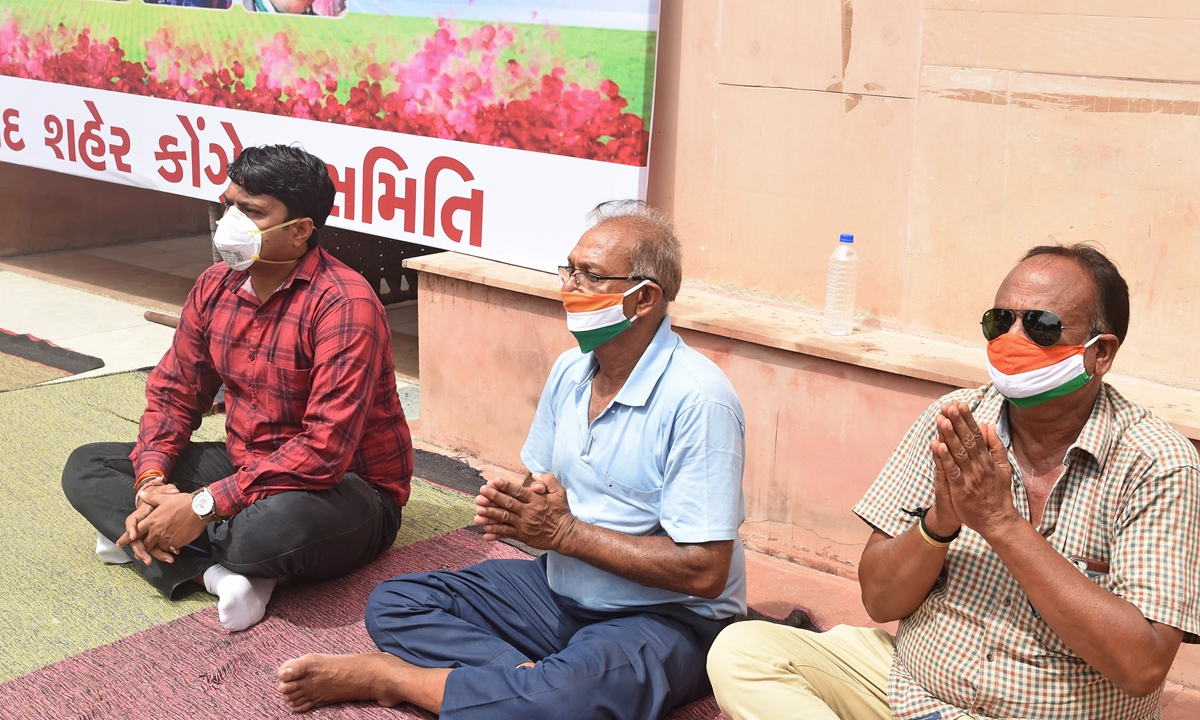Indian reasonable voices to China stifled and silenced amid torrential nationalism
By GT staff reporters Source:Global Times Published: 2020/6/30 9:39:09

Indian residents attend a peace gathering at a war memorial in Ahmedabad on June 26. Photo: AFP
Rational voices in India calling for de-escalation of conflicts and rejecting the "boycott Chinese products" campaign are marginalized and even stifled among rising Indian nationalism and hatred to China amid border disputes between the two, observers say.
As ultra-nationalism is rising in India calling for a campaign to boycott Chinese goods and services, local voices urging cooperative relations and respect to each other between China and India experienced an underestimation and rejection among Indian mainstream society.
At present, there are very few voices heard in India calling for rationality and self-reflection; the voice of Indian society is basically overwhelmingly tough toward China on the stance of border clashes. Even some neutral and moderate claims are hard to hear under pressure from local nationalists, a Chinese observer surnamed Lu who has been living in India for four years told the Global Times.
Voices stressing increasingly close business partnership and human exchanges between two countries are mainly from Indian businessmen and industrial traders. Those people have benefited from Indian's growing exposure to China's stunning economic success. They are normally clear about how India relies on Chinese industrial technologies especially in some sectors ranging from electronics, APIs (active pharmaceutical formulation), to auto formulation.
But their voices were easily attacked by vicious troll army across social media and by some politicians who hold extreme bellicose and nationalist rhetoric to instigate an absolute boycott of China. People criticizing blind boycott and calling for stop of hatred remarks were sometimes tagged as traitors or unpatriotic.
Indian economist and policy analyst Mohan Guruswamy, for example, said the boycott is "both farcical and impractical" partly because India lacks manufacturing functionality.
"When China was struck by COVID-19, all auto manufacturing activity in India slowed down. There is a global dependency on China," Guruswamy said in the Bangalore Mirror report. "So if India wants to compete with China economically, it must have at least a 10-year plan to create an industrial base and an environment to promote entrepreneurship; allow technology and know-how to come into the country; have long-term policies and a leader with a vision to see to their implementation. We don't have any of that in India right now."
Although Guruswamy's analysis was rational, restrained and largely reasonable, his remarks still received vitriolic comments.
"The author seems to have a lot of love for China and utter contempt for India. You cannot continue to feed the snake that comes back to bite you," said a reader who commented on the report of Bangalore Mirror.
"Dear Guru… Do not think deep…. Just join the movement… Be Indian Buy Indian… Boycott China…," another comment gained thumbs up.
"It is imaginable to see the nationalist rhetoric and overwhelming stance against China among mainstream Indian society," Liu Xiaoxue, an associate research fellow at the National Institute of International Strategy under the Chinese Academy of Social Sciences, told the Global Times.
Indian Prime Minister Narendra Modi has tightened control on national media in recent years, and a tough stance toward China has been a coordinated strategy run by the Indian government and the media to reveal tenacious resistance and inviolability against China in border clashes, said Liu.
The uncooperative press who delivered the other side of story was even savagely attacked. Indian mainstream news agency Press Trust of India (PTI) has been widely under fire for publishing an interview of Chinese Ambassador to India Sun Weidong who said "The incident was completely instigated by the Indian side" and urged "mutual respect and support" in the interview with the PTI.
India's largest public broadcasting agency Prasar Bharati alleged in a recent letter to PTI that the recent news reports carried by PTI were detrimental to India's national interest and may have undermined the country's territorial integrity.
"Indian politicians are sometimes swayed by public opinion and nationalism. Moreover, the political opposition will use the border clash as a chance to embarrass the Indian ruling party and force the government to take a stronger stance," Liu said.
Few rational or moderate forces can be seen in Indian politics, and there are only hardliners and extreme nationalists, she said.
Some Indian expats living in China also suffer from Indian social nationalism.
In Mumbai Mirror's recent interview on some Indians living in China, Indian people confirmed they have not experienced "any anti-India sentiment in China" and "There's no hostility when it comes to India… people are always respectful and welcoming."
But their sharing was still attacked for being too "pro-China" and labeled as "unpatriotic."
"If Indians are so satisfied in foreign country and curse your own country then at the difficult times they should not seek any help from India. Instead of contributing to India's development just praise the foreign country and criticize India," read a typical comment posted under the story.
"If you look at the Indian media alone, it looks like the two countries are going to war soon," Lu said.
Moreover, similar to the ruling parties in some other countries, the Indian government is eager to seek external factors to shift domestic contradictions caused by the government's incompetent handling of the domestic coronavirus epidemic.
"The political strategy of Modi's government has also intensified Indian public hatred to China. This tough stance toward China is likely to deepen as the epidemic in India intensifies," Hu Zhiyong, a research fellow at the Institute of International Relations of the Shanghai Academy of Social Sciences, told the Global Times.
Newspaper headline: Repressed reason
Posted in: IN-DEPTH